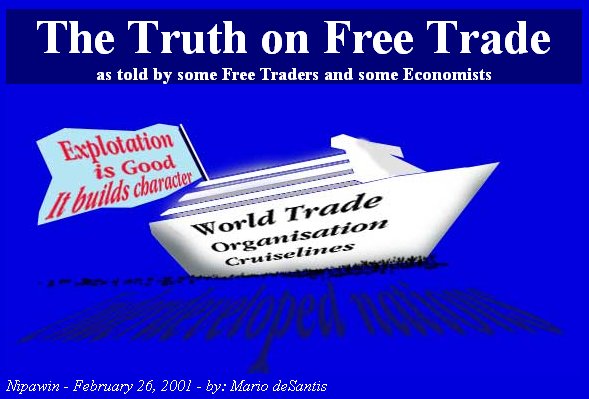Learning Stories
by
Mario deSantis
mariodesantis@hotmail.com
“I am a Canadian, free to speak without fear, free to worship in my own way, free to stand for what I think right, free to oppose what I believe wrong, and free to choose those who shall govern my country.” - -The Rt. Hon. John Diefenbaker, Canadian Bill of Rights, 1960
“The whole judicial system is at issue, it's worth more than one person.”--Serge Kujawa, Saskatchewan Crown Prosecutor, 1991
“The system is not more worth than one person's rights.”--Mario deSantis, 2002
Ensign Stories © Mario deSantis and Ensign
|
|
Nobody can argue against international trade, since trade is as natural as our behaviour to relate to each other. Today, the problem is not trade per se, the problem is the sanction of international contracts which have materialized for example with the World Trade Organization (WTO) and the North American Free Trade Agreement (NAFTA)(1). These international contracts are known as Free Trade, but we have to distinguish "Free Trade" from free trade as our natural propensity to trade within and out of our own geographical confines. Free Trade, as the present international contractual framework to do business between countries, is alienated from the interest of common people, while at the same time there is evidence that our own governments are alienated from the interest of common people as well. And therefore, Free Trade is an artificial agreement which is the result of the corporate agenda of the multinational conglomerates. Mike Moore, Director-General of WTO, wants more international agreement on services and responding to WTO's critics supporting more national autonomy he has stated that these critics have always taken liberties with the truth(2). It appears that only the proponents of Free Trade can speak the ultimate truth and the search for this exclusive truth was explicitly synthesized by Labourist Tony Blair's recent statement that WTO's critics cannot be allowed to stand in the way of rational argument. I don't agree that the search for the truth is the monopoly of our rational elitist Free Traders and as a consequence I certainly don't take literally their preaching. However, we have the interest to become a bit more intelligent in understanding the social issues affecting Free Trade and as a consequence I would like you, readers, to ponder on the intelligence of the language used by our elitist Free Traders as opposed to the language used by some social economists. In reviewing the study "Trade, Income Disparity and Poverty(3)", by Dan Ben-David of Tel Aviv University and L. Alan Winters of Sussex University, WTO's Director-General Mike Moore has stated: This report confirms that although trade alone may not be enough to eradicate poverty, it is essential if poor people are to have any hope of a brighter future. For example, 30 years ago, South Korea was as poor as Ghana. Today, thanks to trade led growth, it is as rich as Portugal. And in their paper "Sharing the Wealth from Growth: Comparing the Canadian and U.S. Experiences(4)" by Jack Mintz and Shay Aba, the authors write: With falling barriers to trade, businesses can more easily shift low-cost production to low-wage economies. The forces of globalization result in greater economic inequality in industrialized economies as the demand for low-skilled workers declines relative to that for skilled labour, whose wages then adjust upward. There is certainly no absolute truth, but we have at least the intelligence to understand which language of the above two is more tuned to our intrinsic values; and at least we, as individuals, can make our choice. References/endnotes Relevant political and economics articles http://www.ftlcomm.com/ensign 1. The problem with Free Trade: the structure of WTO and NAFTA, by Mario deSantis and James deSantis, February 23, 2001 http://www.ftlcomm.com/ensign/desantisArticles/2001_300/desantis332/freetrade.html 2. Liberate trade, not paranoia, by MIKE MOORE, February 21, 2001, The Globe and Mail 3. Trade, Income Disparity and Poverty, by Dan Ben-David of Tel Aviv University and L. Alan Winters of Sussex University http://www.wto.org/wto/english/news_e/pres00_e/pr181_e.htm 4. Sharing the Wealth from Growth: Comparing the Canadian and U.S. Experiences, by Jack Mintz (C.D. Howe Institute and University of Toronto) and Shay Aba (C.D. Howe Institute) http://www.csls.ca/jan01/aba.pdf |
